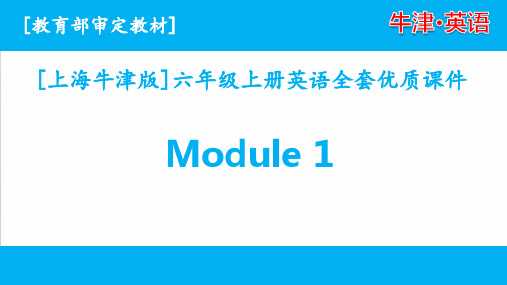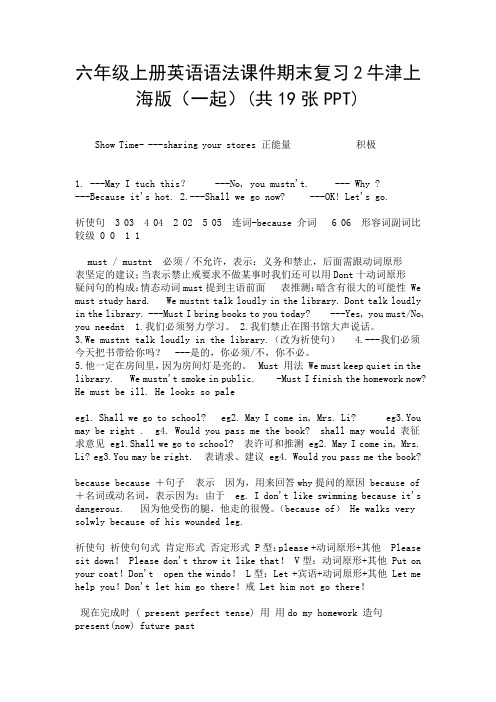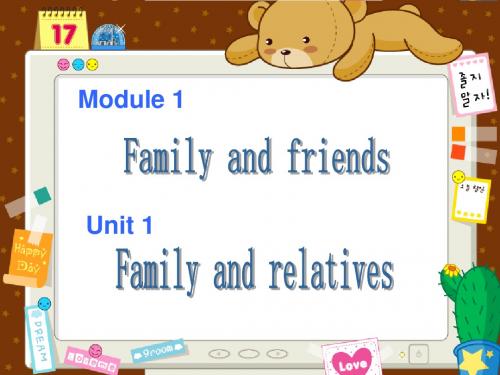六年级上册英语语法课件期末复习1牛津上海版(一起)(共30张PPT).doc
六年级上册英语语法讲义重点词汇句型复习及时间状语从句学习牛津上海版(一起).doc

六年级上册英语语法讲义重点词汇句型复习及时间状语从句学习牛津上海版(一起)授课日期时时间主主题重点词汇句型复习及时间状语从句学习学习目标(本次课的重点、难点以及达到怎样的情感目标) 1. 学会用by 和on 表示乘某种交通工具或步行去某地。
2. 掌握It takes somebody sometime to do something 的句型表达某人花了多少时间做某事。
3. 学会使用 How long 来询问多长时间。
4. 学会使用 a few 、some 、a lot of 等来限定名词的数量。
5. 掌握 when 引导时间状语从句的用法。
6. 养成整理错题的习惯,善用精锐学霸错题本。
教学内容 1 、上次课后巩固作业复习; 2 、互动探索分(此部分 15 分钟左右。
)教学建议:让学生相互之间了解一下彼此上学乘坐交通工具的方式,及所需的时间。
引导学生用本单元的重点句型来练习:How do you go to school? 及How long does it take? 及其相对应的应答I go to school by______ 、It takes about __________ 分(此部分 60 分钟左右;是本节课的重点。
讲练结合。
)教学建议:建议讲解前,让学生自我挑出不认识的单词,然后相互学习,看是否能解决。
老师讲解完毕后,让学生相互之间抢答竞赛,优先说出单词或者汉语意思的学生获胜。
重点词汇讲评【理知识梳理 1】 travel v. 行走;旅行 hour n. 小时 when conj. 当的时候 about adv. 大约 hotel n. 旅馆 kindergarten n. 幼儿园minute n. 分钟 advertisement n. 广告 temple n. 庙宇 ferry n. 渡船 board n. 栏;板 half an hour 半小时 a few 几个 a lot of 许多 light rail 轻轨 department store 百货商店 housing estate 居民区 1. travel v ./ n. 行走,旅行【知识拓展】traveltraveledtraveledtraveling 或者traveltravelledtravelledtravelling 注意过去式、过去分词及现在分词,l 可以双写,也可以不双写。
(完整版)沪教版牛津英语六年级基础语法复习整理

(完整版)沪教版牛津英语六年级基础语法复习整理形容词比较级最高级<一>规则变化A. 单音节和不可拆双音节形容词1.以e结尾+r / sthuge-huger/hugestlarge- larger- largestsafe- safer- safest2.辅音字母+y结尾:去y + ier / iestheavy-heavier-heaviestdirty- dirtier- dirtiesthappy-happier-happiestearly-earlier-earliestfriendly-friendlier-friendliestangry-angrier-angriesthealthy-healthier-healthiesteasy-easier-easiest3.重读闭音节,以一个元音字母加一个辅音字母结尾:双写辅音字母+ er,est big-bigger- biggestfat- fatter- fattestthin- thinner- thinnesthot- hotter- hottestwet- wetter- wettestred- redder- reddest4.直接+ er/eststrong young old short clever newgreattallhighcheappoorrichsmallslowfastlightB. 部分双音节形容词, 多音节形容词famous- more famous- the most famousmodern – more modern – the most moderncareful- more careful- the most carefulbeautiful-more beautiful-the most beautifulexpensive –more expensive (less expensive)- the most expensive interesting- more interesting- the most interesting<二>不规则变化good/well-better –best bad/badly/ill-worse-worst little-less-least + u. n. (few-fewer-fewest) + c. n.many/much-more –most far-farther-farthest(距离)far-further-furthest (程度)<三>程度副词much 用来修饰形容词比较级cheap (便宜的),cheaper (更便宜)much cheaper (便宜得多), good better much better much faster much tallermuch more beautifulfast faster tall tallerbeautifulmore beautiful<四>too, very, quite, so, as …as ,not as /so …as, less …修饰形容词原级very/quite tall (很高),too tall (太高)so tall (如此高)as tall as(与某人一样高)not as tall as /not so tall as (不如某人高)= less tall 注意事项:1、形容词最高级前必须加the ;副词最高级前可加the ,也可不加thee.g. the biggest cities ;draw (the) best 2、much 可修饰比较级:……得多e.g. much taller ……高得多3、原级标志:very 非常;too 太;quite 相当;(not )as+原级+as (不)像……一样;less+原级不如……;so 如此(共五个)时态填空(一) 常用固定词组:A型. doinglike doing/ love doing/ enjoy doing 喜欢做某事hate doing 讨厌做某事finish doing 完成做某事practise doing练习作某事start doing / begin doing开始做某事What about doing…? / How about doing…? 做某事怎么样?be good at doing善于做某事be poor at doing不善于做某事Sb. spend(s) some time doing sth. 某人花时间做某事remember doing记住做过某事forget doing忘记做过某事see sb. doing看见某人正在做by doing通过做某事by not doing通过不做某事stop doing停止做某事instead of doing而不是做某事go doingB型. to dowould like to do / want to do想要做某事forget to do忘记要做某事remember to do 记得要做某事have/has to do不得不做某事had to do不得不做某事will have to do将不得不做某事plan to do计划做某事One's job is / was to do... 某人的工作是做某事like to do/love to do喜欢做某事start to do / begin to do开始做某事need to do需要做某事don’tneed to do/ don’t haveto do不需要做某事learn to do学习做某事promise to do / promise not to do保证做某事/保证不做某事tell sb. to do / tell sb. not to do 告诉某人做某事/告诉某人不做某事ask sb. to do / ask sb. not to do 叫某人做某事/叫某人不做某事It takes/took sb. some time to do sth.某人花时间做某事It’s timeto do sth. 做某事的时间到了C型. doLet sb. do让某人做help sb. (to) do帮助某人做Why not do...? 为何不做......?would rather do / would rather not do 宁愿做/宁愿不做had better do / had better not do最好做/最好不做may do可以做must do必须做will do 将要做would do想要做shall do 应该做should do应该做can't do不能做may not do 不可以做mustn't do不准做won't do将不做wouldn't do将不做shan't do将不做shouldn't do 不应该做do 不需要做needn’t(二) 五种常见时态:现在进行时公式:am/is/are +doing (现在分词)时间状语:now 现在listen 听look 看these days 最近eg.Look, they are planting trees.一般现在时(助动词do/does)公式:V. / V.+s/es/ies (动词原形或动词第三人称单数)时间状语:always 一直usually 经常often 常常sometimes 有时候once a week 每周一次four times a day 一天四次every year 每年How often 多久一次e.g.I usually take an underground to school.He often takes a bus home.一般过去时(助动词did)公式:V. +d/ed/ied或不规则(动词过去式)yesterday 昨天yesterday evening 昨天晚上ten years ago 十年前last week 上个星期in the past 在过去just now 刚才e.g.Ten years ago, he moved to Japan.I sent a letter just now.4. 一般将来时(助动词will/shall)公式:am/is/are going to +V. , will /shall +V. 时间状语:tomorrow 明天next week 下个星期this weekend 这个星期in the future 在将来Soon 很快,不久在15年后in 15 years’ timeHow soon 多久以后e.g.I will fly to America tomorrow.现在完成时(助动词have/has)公式:have/has +done (过去分词)时间状语:already 已经yet 尚never 从未ever 曾经just 刚才once 一次before 在......之前for 6 years 6年how long 多久e.g.I haven’t read this newspaper yet. Mary has already packed her things.。
六年级上册英语语法讲义期末复习1牛津上海版(一起).doc

处理上次课课后巩固作业及预习思考内容。
朗读下面的幽默请同学们来分别朗读一下自己圈出的词及写的句子"All the kids make fun of me/ the boy cried to his mother, "They say I have a big head/1"Dorft listen to them/1 his mother comforted him, ”You have a beautiful head ・ Now stop crying and go to the newly opened store for forty pounds of potatoes.11"How long does it take to get to the store by bike?"(特殊疑问句) “lt ,s not far.You can go there on foot ,, T don^t think we need a lot of potatoes 55 “Just go and get them”"But where's the shopping bag?"(特殊疑问句)MI haven't got one, use your hat.”“所有的孩子都拿我开玩笑,”小男孩哭着跟妈妈说:“他们说我长了一个大脑袋。
”“别听他们的,”他妈妈安慰说:“你的脑袋长得很漂亮。
好了,别哭了,去商店买10磅土豆来。
” “购物袋在哪? ”“我没有购物袋,就用你的帽子吧。
” 仿句:1.问“谁”用who 或whom o 如:Li Lei is a doctor.?Who is a doctor?学员姓名: 年 级:六年级授课日期学科教师: 辅导科目:英语 时 间 期末复习学习目标期末复习教学内容(对主语提问用who,对宾语提问用who, whom均可)去游泳: go swimming 去爬山:go clambing★ each other/ one another【用法提示】each other 用于两者,one another 用于三者或三者以上★ be friendly to sb/be friendly with sb【用法提示】l)be friendly to sb.u ...对某人友好”或“对某人友善",指对别人的态度友好;be friendly to sb=be kind to sb.o 2)friendly adj 一friend n 一friendship n★ help v — helpful adj — helpless adj★ pick uppick sth up/pick up slh; pick it /them up. ★ Promise vpromise (not) to do sth.承诺(不)去做某事★说谎/平躺/下蛋★ pollute v -pollution nair pollution 大气污染 water pollution 水污染 oceanpollution 海洋污染 land pollution 土地污染ground water pollution 地下 水污染noise pollution 噪音污染★ sometimes/sometime/some time / some times【小贴士】分开一段时间(some lime),相聚某个时候(somclime)S连住是有时(sometimes),分开几次几倍行(sometimes)♦ phrasesbe late for 迟到tell lies 说谎for the first time 笫一次walk to school=go to school on foot Take care of=Iook after建议表达法:how about doing= what about doing; lefs do =shall we do ; why not do =why don f t you do【巩固练习】1.( ) ....... .................. ou __________ any books?....... Yes, I __________ them two weeks ago.A.Have...bought; have bought B・ Did...bought; boughtC・ Have ...bought; bought D. Did...buy; have bought2.( )The Smiths _____________ Shanghai for five years.A・ have been to B・ have gone toC・ have been in D. have gone in 3.1 have already been to Hainan Island.(改为否定句)I ___________ been to Hainan Island ____________ ・4、E veryone should help to fight ________________ ・/p$lu:Jh/5、() My films are under the desk. Who can pick them ______________ for me?A. /B. awayC. fromD. up6、()We promise ___________ polluting the environment.A. stopB. to stopC. not to stopD. stopped7、H ow about _________ (walk) to school every day, Ben?How about __________ (clean) the room now?★find out/find/look for【用法】find out:弄明白;find:发现;look for:IE在找(没找到)Keys:Lspent on 2-6 DCDBD【知识梳理2】语法复习 【例题精讲】♦How questions: How 问句:(1) How long does it take you to get to...?句中的how long 用含有哆长吋间”词语的问句来问吋间长短。
沪教牛津英语六年级上册Module 1单元全套优秀课件

I was about seven years old. I was a student. I was short. I had short hair.
I was about seventeen years old. I was a high school student. I was tall. I had short hair.
√ green
She has …
√ four legs
a long tail
√ a big mouth
black
no legs
√ no tail
a round head
Think and say
In Photo 1, Kitty was a cute baby. She was about six months old.
在照片1中,萨莉是一个 婴儿。她大约两个月大。她 很小并且很可爱。
In Photo 2, Sally was one year old. Her hair was short and her eyes were big.
在照片2中,萨莉一岁。她 的头发很短,她的眼睛很大。
In Photo 3, Sally was about six years old. She was a primary school student.
后来,小贾斯廷有四条腿。他是绿色的。他遇见一只乌龟。 贾斯廷:你是我的妈妈吗?
乌龟:不,我不是你的妈妈。你的妈妈有一张大嘴。她 能捉苍蝇。
Little Justin finds his mother. What does his mother look like? Think and tick.
She is …
(完整版)沪教版牛津英语六年级基础语法复习整理

形容词比较级最高级<一>规则变化A. 单音节和不可拆双音节形容词1.以e结尾+r / sthuge-huger/hugestlarge- larger- largestsafe- safer- safest2.辅音字母+y结尾:去y + ier / iestheavy-heavier-heaviestdirty- dirtier- dirtiesthappy-happier-happiestearly-earlier-earliestfriendly-friendlier-friendliestangry-angrier-angriesthealthy-healthier-healthiesteasy-easier-easiest3.重读闭音节,以一个元音字母加一个辅音字母结尾:双写辅音字母+ er,est big-bigger- biggestfat- fatter- fattestthin- thinner- thinnesthot- hotter- hottestwet- wetter- wettestred- redder- reddeststrong young old short clever newgreattallhighcheappoorrichsmallslowfastlightB. 部分双音节形容词, 多音节形容词famous- more famous- the most famousmodern – more modern – the most moderncareful- more careful- the most carefulbeautiful-more beautiful-the most beautifulexpensive – more expensive (less expensive)- the most expensive interesting- more interesting- the most interesting<二>不规则变化good/well-better –bestbad/badly/ill-worse-worstlittle-less-least + u. n. (few-fewer-fewest) + c. n.many/much-more –mostfar-farther-farthest (距离)far-further-furthest(程度)<四>too, very, quite, so, as…as,not as /so…as, less …修饰形容词原级very/quite tall(很高),too tall(太高)so tall(如此高)as tall as(与某人一样高)not as tall as /not so tall as(不如某人高)= less tall注意事项:1、形容词最高级前必须加the;副词最高级前可加the,也可不加thee.g. the biggest cities;draw (the) best2、much可修饰比较级:……得多e.g. much taller ……高得多3、原级标志:very非常;too太;quite相当;(not)as+原级+as (不)像……一样;less+原级不如……;so如此(共五个)时态填空(一) 常用固定词组:A型. doinglike doing/ love doing/ enjoy doing 喜欢做某事hate doing 讨厌做某事finish doing 完成做某事practise doing练习作某事start doing / begin doing开始做某事What about doing…? / How about doing…? 做某事怎么样?be good at doing善于做某事be poor at doing不善于做某事Sb. spend(s) some time doing sth. 某人花时间做某事remember doing记住做过某事forget doing忘记做过某事see sb. doing看见某人正在做by doing通过做某事by not doing通过不做某事stop doing停止做某事instead of doing而不是做某事go doingB型. to dowould like to do / want to do想要做某事forget to do忘记要做某事remember to do 记得要做某事have/has to do不得不做某事had to do不得不做某事will have to do将不得不做某事plan to do计划做某事One's job is / was to do... 某人的工作是做某事like to do/love to do喜欢做某事start to do / begin to do开始做某事need to do需要做某事don’t need to do/ don’t have to do不需要做某事learn to do学习做某事promise to do / promise not to do保证做某事/保证不做某事tell sb. to do / tell sb. not to do 告诉某人做某事/告诉某人不做某事ask sb. to do / ask sb. not to do 叫某人做某事/叫某人不做某事It takes/took sb. some time to do sth.某人花时间做某事It’s time to do sth. 做某事的时间到了C型. doLet sb. do让某人做help sb. (to) do帮助某人做Why not do...? 为何不做......?would rather do / would rather not do 宁愿做/宁愿不做had better do / had better not do最好做/最好不做can do能做may do可以做must do必须做will do 将要做would do想要做shall do 应该做should do应该做can't do不能做may not do 不可以做mustn't do不准做won't do将不做wouldn't do将不做shan't do将不做shouldn't do 不应该做needn’t do 不需要做(二) 五种常见时态:现在进行时公式:am/is/are +doing (现在分词)时间状语:now 现在listen 听look 看these days 最近eg.Look, they are planting trees.一般现在时(助动词do/does)公式:V. / V.+s/es/ies (动词原形或动词第三人称单数)时间状语:always 一直usually 经常often 常常sometimes 有时候once a week 每周一次four times a day 一天四次every year 每年How often 多久一次e.g.I usually take an underground to school.He often takes a bus home.一般过去时(助动词did)公式:V. +d/ed/ied或不规则(动词过去式)时间状语:yesterday 昨天yesterday evening 昨天晚上ten years ago 十年前last week 上个星期in the past 在过去just now 刚才e.g.Ten years ago, he moved to Japan.I sent a letter just now.4. 一般将来时(助动词will/shall)公式:am/is/are going to +V. , will /shall +V. 时间状语:tomorrow 明天next week 下个星期this weekend 这个星期in the future 在将来Soon 很快,不久in 15 years’ time 在15年后How soon 多久以后e.g.I will fly to America tomorrow.现在完成时(助动词have/has)公式:have/has +done (过去分词)时间状语:already 已经yet 尚never 从未ever 曾经just 刚才once 一次before 在......之前for 6 years 6年how long 多久e.g.I haven’t read this newspaper yet.Mary has already packed her things.。
牛津上海英语六年级上册 Unit1(共40张PPT)

Question number 6: She’s my aunt’s sister. Her daughter is my sister. Who’s she?
She’s your mother.
Question number 7: He is my father’s son. But he’s not my brother. Who’s he?
cousins
A: What did she get? B: She got_______. A: Who did she get _______from? B: She got _________from________.
A: What did she get? B: She got_______. A: Who did she get _______from? B: She got _________from________.
/
nephew
/ /
This is my uncle and this is my I’m their _a_u_n_n_te.p_h_e_w_____.
These are my uncle and aunt. I’m their ____n_i_ec_e______.
• What’s this? • What do you usually say on your friend’s birthday?
Alice has got a lot of presents and
birthday cards from her family and
relatives. 1.get sth. from sb.
2. a lot of 许多
从某人处得到某物
六年级上册英语语法课件期末复习2牛津上海版(一起)(共19张PPT).doc

六年级上册英语语法课件期末复习2牛津上海版(一起)(共19张PPT)Show Time- ---sharing your stores 正能量积极1. ---May I tuch this? ---No, you mustn't. --- Why ?---Because it's hot. 2.---Shall we go now? ---OK! Let's go.祈使句 3 03 4 04 2 02 5 05 连词-because 介词 6 06 形容词副词比较级 0 0 1 1must / mustnt 必须/不允许,表示:义务和禁止,后面需跟动词原形表坚定的建议;当表示禁止戒要求不做某事时我们还可以用Dont十动词原形疑问句的构成:情态动词must提到主语前面 We must study hard. We mustnt talk loudly in the library. Dont talk loudlyin the library. ---Must I bring books to you today? ---Yes, you must/No, you neednt 1.我们必须努力学习。
2.我们禁止在图书馆大声说话。
3.We mustnt talk loudly in the library.(改为祈使句)4.---我们必须今天把书带给你吗? ---是的,你必须/不,你不必。
5.他一定在房间里,因为房间灯是亮的。
Must 用法 We must keep quiet in the library. We mustn't smoke in public. -Must I finish the homework now? He must be ill. He looks so paleeg1. Shall we go to school? eg2. May I come in, Mrs. Li? eg3.You may be right . g4. Would you pass me the book? shall may would 表征求意见 eg1.Shall we go to school? 表许可和推测 eg2. May I come in, Mrs.Li? eg3.You may be right. 表请求、建议 eg4. Would you pass me the book?because because +句子表示因为,用来回答why提问的原因 because of+名词或动名词,表示因为;由于 eg. I don't like swimming because it's dangerous. 因为他受伤的腿,他走的很慢。
牛津上海英语六年级上册 Unit1(共16张PPT)

We’re their _____g_ra_n_d_d_a_u_g_h.ters
a birthday card Happy birthday!
• What is it?
present presents
Alice has got a lot of presents and birthday cards from her family and relatives.
Module 1 Unit 1
Guess Father And Mother I Love You
aunt
uncle
cousin
cousin
relative [‘relətiv]
n. 亲戚
Look and learn
My name is Alice. These are my family and relatives. This is my grandfather. This is my grandmother. This is my mother. This is my father. This is my brother. This is my aunt. These are my uncles. These are my cousins.
John wants to make a birthday card for his father.
They are my family members. n. 成员
My family tree
家谱
grandfather
grandmother
mother
father
uncle
aunt
uncle
brother
This is Alice.
- 1、下载文档前请自行甄别文档内容的完整性,平台不提供额外的编辑、内容补充、找答案等附加服务。
- 2、"仅部分预览"的文档,不可在线预览部分如存在完整性等问题,可反馈申请退款(可完整预览的文档不适用该条件!)。
- 3、如文档侵犯您的权益,请联系客服反馈,我们会尽快为您处理(人工客服工作时间:9:00-18:30)。
六年级上册英语语法课件期末复习1牛津上
海版(一起)(共30张PPT)
All the kids make fun of me, the boy cried to his mother, They say
I have a big head. Don't listen to them, his mother comforted him, You
have a beautiful head. Now stop crying and go to the newly opened store
for forty pounds of potatoes. How long does it take to get to the store
by bike? Its not far.You can go there on foot I dont think we need a
lot of potatoes Just go and get them But where's the shopping bag? I haven't
got one, use your hat. (特殊疑问句)(特殊疑问句)
知识梳理1 1 词汇复习★★ go:【考点】go+ doing 去购物: go shopping 去野营: go camping 去骑自行车:go cycling 去
游泳:go swimming 去爬山:go clambing
★ each other/ one another each other 用于两者, one another 用于三者
或三者以上
★ be friendly to sb/be friendly with sb 1)be friendly to sb. ... 对某
人友好或对某人友善,指对别人的态度友好; be friendly
to sb=be kind to sb.。
2)friendly adjfriend nfriendsh ip n
★ sometimes/sometime/some time / some times 口诀:分开一段时间(some
time ), 相聚某个时候(sometime) S连接是有时(sometimes),分开几次
几倍行(some times)
some time 某段时间。
常与for连用。
We plan to stay in Hainan for some
time.
Sometime 副词:某个时候。
可指过去或将来的某个时候。
Would you come to
the cinema with me, sometime? 赏脸找个时间和我看场电影吗?
sometimes 副词:有时 I argue with my parents sometimes.
some times 几次 I am sure that we have met some times before.我
肯定我们之前见过几次了。
例题精讲 1. I __________receive letters from him. 2. The newly bought
microwave oven failed to work__________. 3. I bought this hat
_________last summer. 4. I will keep the computer for_____, so you
can use it. sometimes some times sometime some time
★spend/cost/pay/take 人+ spend+时间、金钱+in+ving/on sth. 人+ pay + 时间、金钱 + for +n/ving 物+ cost+ 人+ 金钱
It+ takes + 人 + 时间 + to do I spend 5 yuan buying this apple. I paid
5 yuan for this apple. This apple cost me 5 yuan. I spend 5 yuan on this
apple.
It took me 2 hours to do my homework. I spend 2 hours doing my homework.
★find out/find/look for find out: 弄明白; find:发现; look for:
正在找(没找到)
★职业名词 policeman policewoman
fireman cook postman
★★arrive /get / reach arrive in + 大地方 arrive at +
小地方 get to= arrive at = reach
How引导的句式分为两种:感叹句:how+ 形容词+主语+谓语 eg. 这条裙子好
漂亮!特殊疑问句: how +助动词/情态动词+主语+动词原形 How +be动词
+主语 How beautiful this dress is!
1、询问身体健康状况;或事物发展情况,意为怎样 e.g. 你妈妈今天怎么样的?
e.g.你家的事怎么样了? How is your mother? How is your family?
2、询问交通状况: e.g. 麦克今天怎么去上学的? How does Mike go
to school today? How can I get to the library? 怎么去图书馆啊?
3、询问天气状况: e.g. 今天的天气怎么样? How is the wheather today?
4、询问程度: e.g. 你有多喜欢这本书呢? How do you like this book? 你
认为汤姆这个人怎么样? How do you think about Tom?
How long 1、询问长度: e.g. 这条河有多长? 2、表示时间长短,主要对一
段时间提问: e.g. 你去上学要用多长时间? How long is the river? How long
does it take you to go to school?
◆a few, some, a lot of a few一些;some一些;a lot of许多这些词
怎么用呢?
a few用来修饰可数名词,表示肯定,意为少数的;几个;一些。
例如: I have
a few books.
some是不定量代词,意为一些,既可以修饰可数名词,也能修饰不可数名词,常用于肯定句, I'd like to have some milk for breakfast.
当用在特殊疑问句中时表示渴望得到对方的肯定回答。
例如: -Would you like some water? -No, thank you.
1.词汇复习:6A课本中出现的重要词汇及句型 2.语法复习:How引导的特殊疑问句、连词when和修饰名词的一些短语 (l) How long does it take you to get to?你花多长时间到达?句中的how long用含有多长时间词语的问句来问时间长短。
可以用It takes sb some time to do sth的句型来回答,也可以用for, since等引导的时间状语来回答。
例如: (2) How does Simon go to school? how用于询问交通工具。
1. 复习精讲提升部分的内容;
2. 请在规定时间内完成讲义中的课后巩固部分。
1.复习六年级上册知识点,整理易错题,总结出你认为的会考到的10个单词,10个句型以及五个语法点。
并在下节课向小伙伴讲解你总结的这25个知识点。
2. 下节课向同学们和老师分享一个富有正能量的故事,并总结出道理,分享给大家,表现优异的将会有神秘大奖哦。
